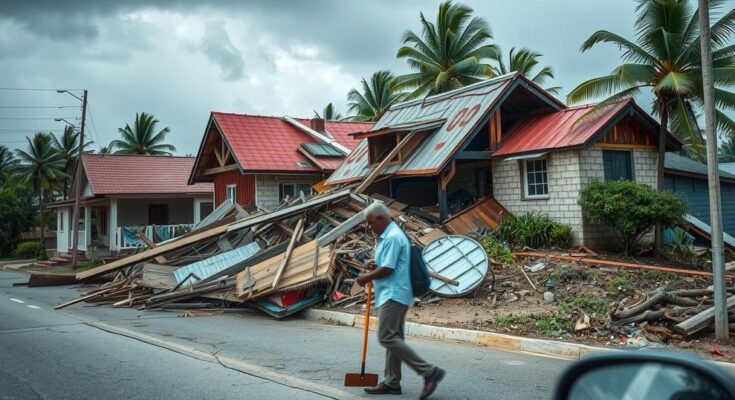Cyclone Chido struck Mayotte on December 15, causing extensive damage and prompting fears of thousands of casualties. The storm’s intensity is linked to climate change, evidenced by warm Indian Ocean waters. With destroyed infrastructure and severed communication, rescue efforts are critically hindered. Following its impact on Mayotte, Cyclone Chido also affected Mozambique, raising humanitarian alert levels for millions at risk.
Cyclone Chido devastated Mayotte on December 15, leaving a trail of destruction in its wake. The cyclone flattened shantytowns and significantly damaged vital infrastructure, including the local airport. Experts attribute the severity of this storm to climate change, particularly the rising temperatures of the Indian Ocean waters. The situation is dire, as power, water, and communication lines are down, impeding rescue operations and potentially resulting in thousands of casualties.
Following its impact in Mayotte, Cyclone Chido subsequently made landfall in Mozambique, exacerbating the crisis. The United Nations Office for the Coordination of Humanitarian Affairs (UN OCHA) has raised alarms over the plight of 1.7 million individuals currently at risk in the affected areas. European Commission President Ursula von der Leyen, along with the World Health Organization (WHO), have committed to providing aid. However, the presence of approximately 100,000 undocumented residents complicates an accurate assessment of the total damage sustained.
Cyclone Chido is part of an increasing trend of extreme weather events linked to climate change, which has heightened the frequency and intensity of cyclones in regions like the Indian Ocean. The cyclone’s impact illustrates the vulnerabilities of coastal communities in Mayotte and Mozambique, emphasizing the importance of disaster preparedness and climate adaptation strategies. This event not only poses immediate dangers of loss of life and property but also threatens long-term recovery efforts in the region, particularly given the socio-economic conditions exacerbated by the storm.
In summary, Cyclone Chido has inflicted catastrophic destruction in Mayotte and Mozambique, with the potential for a considerable death toll and widespread humanitarian crises. The cyclone serves as a reminder of the escalating threats posed by climate change and the urgent need for coordinated international response efforts. As aid organizations mobilize to assist the affected populations, the situation remains critical, necessitating comprehensive assessments and rapid intervention to mitigate further suffering.
Original Source: m.economictimes.com




